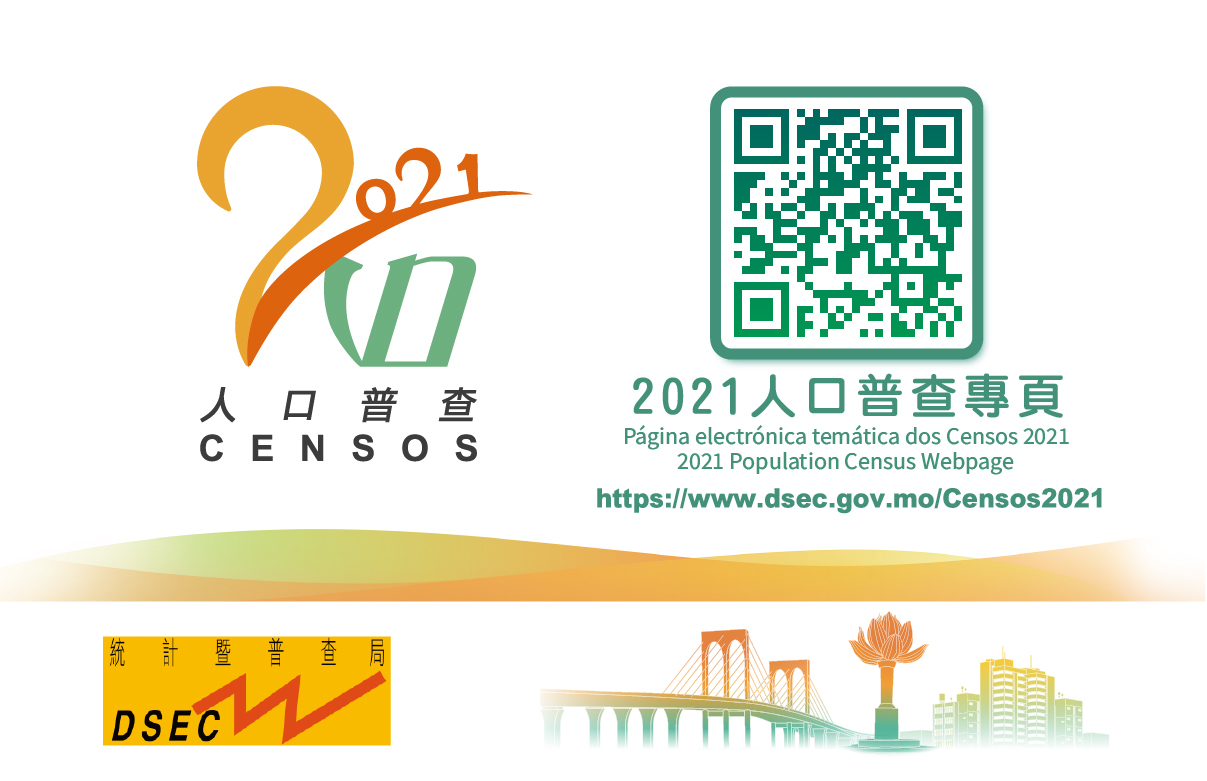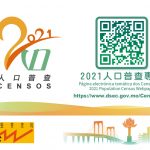 2021 population census webpage
2021 population census webpage
The 2021 Population Census will be conducted from 7 to 21 August, during which the Statistics and Census Service (DSEC) will collect data from over 270,000 residential, industrial and commercial units through short-form and long-form questionnaires. DSEC has organised around 2,200 trained staff to collect data in different districts in Macao.
DSEC held a press conference today (3 Aug), at which DSEC Director, Ieong Meng Chao, Deputy Director, Mak Hang Chan, and Chief of the Department of Computer and Information, Lai Ka Chon, introduced arrangements for data collection, online completion, pandemic prevention measures, system security and data confidentiality for the 2021 Population Census.
Long form and short form are available online to facilitate data submission
Notification letters have been posted in batches to more than 270,000 residential, industrial and commercial units in Macao, and Census officers will visit the units to collect data between 7 and 21 August. Census data are collected through long-form and short-form questionnaires. Households of about one-seventh of the units will be selected to answer the long form while the remaining households will answer the short form.
Households that are selected to complete the long form may complete the questionnaire via computer or mobile phone. To facilitate submission of information, households are encouraged to respond to the Census via the Online Questionnaire System. Households may complete the online questionnaire between 7 and 16 August by scanning the QR code on the notification letter or questionnaire, or by visiting the webpage of the 2021 Population Census (https://www.dsec.gov.mo/Censos2021).Households that complete the online questionnaire will automatically be entered into the Early Completion for Greater Chance of Winning Lucky Draw.
The short-form questionnaire contains 7 questions on the basic demographic characteristics of the population, such as gender, year and month of birth and place of birth. Households may complete the form via computer or mobile phone, or fill out the paper questionnaire and return it to the visiting Census officers. Alternatively, they may schedule an interview appointment with the Census officers by calling the Census Hotline.
The long-form questionnaire collects information on socio-economic characteristics of the population in addition to the basic information requested in the short form, including nationality, marital status, educational attainment, job industry, occupation and employment earnings. Besides, DSEC introduced new data topics on self-care ability of the elderly aged 60 and above to this round of Population Census, which can serve as a reference source for future government policy making. Households that are selected to answer the long form may complete the questionnaire via computer or mobile phone, or provide information to the visiting Census officers. They may schedule an interview appointment with the Census officers by calling the Census Hotline.
Furthermore, the Census questionnaire also collects housing information, such as number of households in a unit, tenure of accommodation (e.g. owner-occupier or tenant) and amount of monthly mortgage or rental payments.
Three Ways to Identify a Census Officer
During the 15-day data collection period from 7 to 21 August, DSEC will set up 10 Census work stations in Macao, and about 2,200 Census officers will be arranged in pairs to visit units in different districts to collect data from household members through mobile tablets.
Census officers can be identified by three basic characteristics: a 2021 Population Census uniform, a Census ID badge and a grey Census shoulder bag. Moreover, households may view the details of the Census officers by scanning the QR code on the notification letter or questionnaire, or by calling the Census Hotline at 8809 8809.
Implementation of Pandemic Prevention Measures to Safeguard the Health of Respondents and Census Officers
To align with the pandemic prevention guidelines laid down by the SAR government and to ensure a safe Census operation, all Census officers must undergo a nucleic acid test and present a negative test result before 7 August. They are required to show a green health code and have their temperature checked to enter the Census work stations. They must wear a mask when performing their duties and keep a distance of at least 1 metre from the respondents. Also, they have to wash their hands with alcohol-based handrub and clean the mobile tablets with alcohol before and after visiting a household.
Strengthened Cyber Security to Protect Data
DSEC attaches great importance to data confidentiality and has taken various measures to ensure the security and confidentiality of the information provided by households. For instance, all text messages sent by DSEC will include a 4-digit security code, a one-time password is required to access the online questionnaire, and data are transmitted via encrypted connection and will be stored only in DSEC servers. In addition, DSEC has exchanged views on system operation with Cybersecurity Incident Alert and Response Centre (CARIC) and established a liaison mechanism with them that will operate on a round-the-clock basis to ensure a safe and efficient operation of the relevant systems.
The Population Census is conducted in accordance with the Administrative Regulation no. 6/2021 – “2021 Population Census Regime”. All Census respondents must provide the required information within the specified period. Under the Dispatch no. 242/GM/99 – “Statistical Confidentiality”, all the information collected will be kept in strict confidence. DSEC appeals to the public to support the Census, co-operate with the visiting Census officers and provide accurate information. For more details, please visit the webpage of the 2021 Population Census (https://www.dsec.gov.mo/Censos2021) or call the Census Hotline at 8809 8809.


